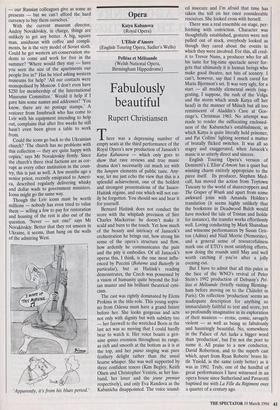Opera
L'Elisir d'Amore (English Touring Opera, Sadler's Wells) PeIl6as et Melisande (Welsh National Opera, Birmingham Hippodrome)
Fabulously beautiful
Rupert Christiansen
There was a depressing number of empty seats at the third performance of the Royal Opera's new production of Janacek's Katya Kabanova — which only goes to show that rave reviews and true music drama don't necessarily cut much ice with the lumpen elements of public taste. Any- way, let me just echo the view that this is a splendid achieveMent, one of the boldest and strongest presentations of the Isaacs- Haitink regime, and one which will not eas- ily be forgotten. You should see and hear it for yourself.
Bernard Haitink does not conduct the score with the whiplash precision of Sire Charles Mackerras: he doesn't make it scald and burn to the touch. Yet how much of the beauty and intricacy of Janacek's orchestration he brings out, how strong his sense of the opera's structure and flow, how ardently he communicates the pain and the pity it embodies. Of all Janacek's operas this, I think, is the one most influ- enced by Puccini (Boheme and Butterfly in particular), but as Haitink's reading demonstrates, the Czech was possessed by a vision of humanity quite beyond the Ital- ian master and his brilliant theatrical cyni- cism.
The cast was rightly dominated by Elena Prokina in the title-role. This young sopra- no from Odessa must have a grand future before her. She looks gorgeous and acts not only with dignity but with subtlety too — her farewell to the wretched Boris in the last act was so moving that I could hardly bear to watch it. Her voice boasts a gen- uine spinto evenness throughout its range, as rich and smooth at the bottom as it is at the top, and her piano singing was pure feathery delight rather than the usual hoarse whisper. She was well supported by three confident tenors (Kim Begley, Keith Olsen and Christopher Ventris, as her hus- band, her lover and the jeune premiei- respectively), and only Eva Randova as the Kabanicha disappointed. The voice sound- ed insecure and I'm afraid that time has taken the toll on her once considerable resources. She looked cross with herself.
There was a real ensemble on stage, per- forming with conviction. Character was thoughtfully established, gestures were not pulled out of stock, everybody looked as though they cared about the events in which they were involved. For this, all cred- it to Trevor Nunn, a producer who for all his taste for big-time spectacle never for- gets that ultimately it is human beings who make good theatre, not bits of scenery. I can't, however, say that I much cared for Maria Bjomson's set. It was very ugly, for a start — all muddy elemental swirls (sug- gesting, I suppose, the rush of the Volga and the storm which sends Katya off her head) in the manner of Munch but all too reminiscent of Aladdin's Cave at Gor- ringe's, Christmas 1963. No attempt was made to render the suffocating enclosed- ness of the Kabanicha's establishment, in which Katya is quite literally held prisoner, and Pat Collins' lighting seemed a matter of brutally flicked switches. It was all so stagey and exaggerated, when Janacek's music is so utterly direct and sincere.
English Touring Opera's version of Donizetti's L'Elisir d'Amore has a quiet but winning charm entirely appropriate to the piece itself. Its producer, Stephen Med- calf, has moved the action from Toytown Tuscany to the world of sharecroppers and The Grapes of Wrath and apart from some awkward joins with Amanda Holden's translation (it seems highly unlikely that the bookstore in Deadwood Bulch would have stocked the tale of Tristan and Isolde for instance), the transfer works effortlessly well. Loving conducting by Mark Shanahan and winsome performances by Susan Grit- ton (Adina) and Niall Morrie (Nemorino), and a general sense of resourcefulness mark one of ETO's most satisfying efforts, now doing the rounds until May and well worth catching if you're after a jolly evening out.
But I have to admit that all this pales in the face of the WNO's revival of Peter Stein's 1992 production of Debussy's Pel- leas et Melisande (briefly visiting Birming- ham before moving on to the Chatelet in Paris). On reflection 'production' seems an inadequate description for anything so immaculately faithful to text and score, yet so profoundly imaginative in its exploration of their nuances — erotic, comic, savagely violent — as well as being so fabulously and hauntingly beautiful. No, somewhere in the Palace of Art lurks a bigger word than 'production', but I'm not the poet to name it. All praise to a new conductor, David Robertson, and to the superb cast which, apart from Ryan Roberts' brave lit- tle Yniold, is the same (only better) as it was in 1992. Truly, one of the handful of great performances I have witnessed in an opera house since Sutherland and Pavarotti baptised me with La Fille du Regiment over a quarter of a century ago.


























































 Previous page
Previous page